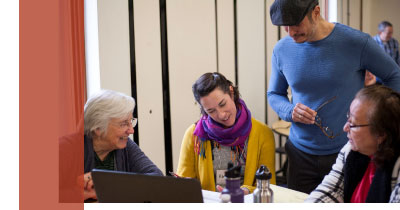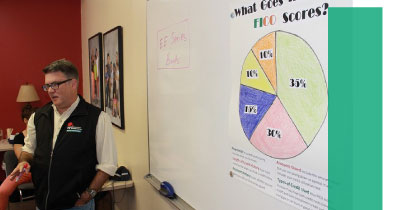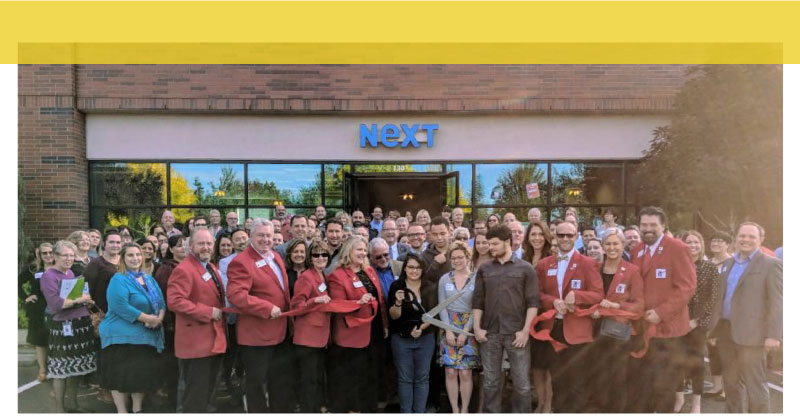Most financially vulnerable households in southwest Washington are unable to focus on asset building, because—even after working long hours—they have to make tradeoffs to meet the most basic of needs.
 Policy discussions aimed at addressing these inequities often focus on increasing low minimum wages, which are one part of the problem. However, Pew Trusts’ Pathways to Economic Mobility report provides a more complex picture. Its findings show that asset building is more effective than raising incomes when it comes to increasing economic mobility. That’s because savings can be used productively throughout our lives to advance our personal financial health, or the economic prospects of our children.
Policy discussions aimed at addressing these inequities often focus on increasing low minimum wages, which are one part of the problem. However, Pew Trusts’ Pathways to Economic Mobility report provides a more complex picture. Its findings show that asset building is more effective than raising incomes when it comes to increasing economic mobility. That’s because savings can be used productively throughout our lives to advance our personal financial health, or the economic prospects of our children.
So why are many policymakers and advocates pushing to increase wages? One possible reason is that conventional wisdom says people in poverty don’t earn enough money to save. Research also proves this assumption wrong. Those with very little money, have a wealth of creativity, resourcefulness and tenacity when it comes to financial decisions. How else would a family of four to survive on $30,000 a year—an income that actually lands above the 2019 federal poverty guidelines. Thus, when given the opportunity, people who have less actually save at greater rates than those who have more.
Unfortunately, asset building incentives have historically benefited people with higher incomes. Federal efforts such as tax deductions for homeownership and retirement savings aren’t designed to assist low-income families, who generally have low or zero tax liability. In fact, an investigation into federal expenditures aimed at encouraging savings and investment showed that more than half of federal government spending on asset building subsidies in 2009 went to the top 5 percent of taxpayers.
Local Efforts Break Down Barriers
In spite of these systemic issues, local nonprofits and community collaboratives are finding ways to provide opportunities for asset building to those with the least in our region. Some of the more familiar programs focus on wealth creation strategies, such as those improving access to traditional financial tools, matched savings plans and low-interest loans.
 The Community Foundation’s grantmaking framework focuses on three community impact areas that provide local residents with greater access to opportunity and increased security. Asset building is one of the three, and we’ve broadened its scope to include programs improving employment services, financial planning and credit repair, community livability, economic development and more.
The Community Foundation’s grantmaking framework focuses on three community impact areas that provide local residents with greater access to opportunity and increased security. Asset building is one of the three, and we’ve broadened its scope to include programs improving employment services, financial planning and credit repair, community livability, economic development and more.
While these programs play a critical role in improving the health of our community on all levels, they also represent the smallest portion of proposals submitted to our Focus Grant program. To provide a better sense of how we’ve applied funding in this impact area, we’ve highlighted a few programs that are helping individuals and businesses build assets in Clark, Cowlitz and Skamania Counties.
Skamania County
Residents in the Columbia River Gorge have a nearby resource in the Skamania Klickitat Community Network, which recently received a Focus Grant. With this support, the Network is able to offer an array of community-wide trainings. Among the many topics covered are budgeting courses and securing matched savings accounts for college-bound students. While finances are a focus, the ultimate goal is to connect the rural towns of the mid-Columbia Gorge with resources and services that allow local families and communities to build capacity and resilience, and improve livability.
Cowlitz County
In Longview, the Financial Independence Center at Lower Columbia CAP was created as a hub for financial well-being. This collaborative effort involves more than twenty community partners working to achieve greater economic prosperity for low- to moderate-income earners through financial services, products and education. Additionally, the Bank on Cowlitz County program works to expand access to financial services for the County’s unbanked and underbanked residents, which is a critical first step to asset building for working families and individuals.
Clark County

The Clark County Asset Building Coalition uses a similar model and shares similar goals. Metropolitan Family Service (MFS) is one partner in this coalition and is also a Community Foundation grantee. Over the years, MFS has used grants to support its Ways to Work, a vehicle loan program, as well as financial education and credit repair programs. Through its Ways to Work program, working parents can access safe loans to purchase, refinance or repair vehicles, thus equipping families with an important asset many of us take for granted: reliable transportation. In some cases this can be the difference maker in maintaining a job and getting children to daycare or school every day.
The Hispanic Metropolitan Chamber (HMC), another coalition partner and Community Foundation grantee, focuses on increasing the economic advancement of Latinos in Oregon and southwest Washington. Among its offerings are technical assistance and loan programs available to local Latinx-owned businesses. Whether starting or expanding, the goal is to increase revenues and family income for a population that confronts many barriers to wealth creation. With a grant from the Community Giving Fund, HMC engaged 100 participants in educational courses and consulting aimed at starting or expanding businesses. It also provided 50 others with access to college workshops, scholarships and internships.
Our financial health intersects with daily life in many ways, and Clark County Volunteer Lawyers Program (CCVLP) understands how it plays out in the justice system. A recent Focus Grant enabled them to implement the Fresh Start program, which gives people with limited resources the advantage of legal advice to help resolve debt, clear up court fines and improve criminal backgrounds. Legal issues such as these can bar people from housing, employment and even financial services; so by giving clients a fighting chance, CCVLP is setting them up to achieve success in other areas of their life.
Another recent organization, Workforce Southwest Washington, used a Focus Grant to support the opening of Next, a new resource center that connects young adults to a variety of employment and education pathways. Staffed by more than 15 community partners and businesses, Next provides opportunities such as apprenticeships and paid internships, and services like interview prep, career mentorship and job training. Here, youth are able to design the future they want, whether that is post-secondary education or a career in manufacturing, construction, technology or healthcare. Since opening in September, the center has welcomed more than 650 youth and enrolled 80 percent of them in programming.
Funding for a Vibrant Future
As you can see, there are a broad range of approaches that allow hard-working folks to build financial capital. Each strategy demonstrates another way in which assets can impact and transform lives.
With a financial cushion, individuals and families are better able to weather emergencies, access higher education and avoid predatory lending schemes. Most important of all, is the behavioral effect of asset creation. When people establish a nest egg, they also establish a foundation of security and hope from which they can pursue long-term aspirations.
We know that in order for people to make sound plans for the future, they need the currency of the future. That requires access to the right tools and skills for saving and asset building. By dedicating funding to programs like these, the Community Foundation hopes to nurture asset building networks and help our nonprofit partners spark wealth creation for those who stand to benefit most.
